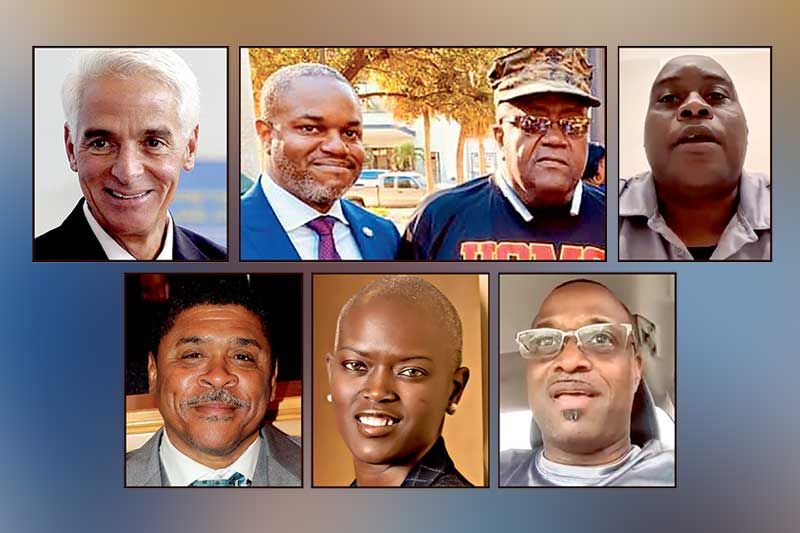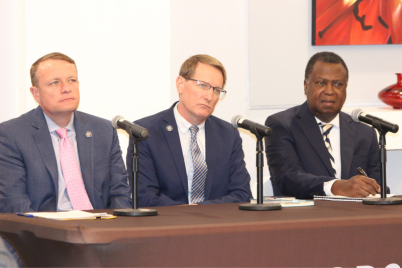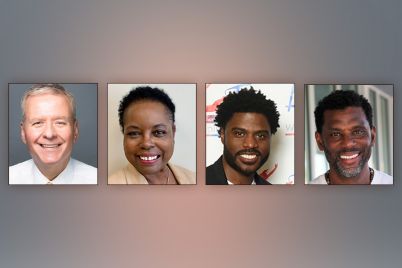Congressman Charlie Crist held a virtual forum, including local veterans and faith leaders addressing the unique challenges faced by Black veterans both during and after their service. L-R, Crist, Outreach Director Gershom Faulkner, Vietnam vet Eddie Pringle, James Ervin, retired veteran, Pastor Manuel Sykes, Retired Army Sgt. Maj. Elizabeth Siplin and Retired Army Sgt. First Class Dwight Barber.
BY FRANK DROUZAS, Staff Writer
ST. PETERSBURG — On the 19th anniversary of the September 11, 2001, terrorist attacks, Congressman Charlie Crist (D-FL) shared words of support and gratitude for our nation’s fallen heroes and their families at the Madeira Beach 9/11 Memorial, visited Bay Pines National Cemetery to honor fallen service members, and ended the day by hosting the Pinellas Black Veterans Forum.
The virtual forum included local veterans and faith leaders addressing the unique challenges faced by Black veterans both during and after their service.
Moderated by Crist’s Outreach Director Gershom Faulkner, Crist recognized our country’s servicemen, who “faced unimaginable challenges and hardship so that we may live free.”
“It’s incumbent upon all of us,” Crist said, “to honor their promise, the promise that we made when you stood up to defend our country, and make sure that you’re provided the medical care, earned benefits, access to higher education, the career training and community support that you so richly deserve.”
Too often, veterans face unforeseen obstacles in their transition back to civilian life, he noted, such as challenges that keep them from accessing the resources they need. This is particularly true of Black veterans and other veterans of color, who often face discrimination and an unfair justice system.
To tackle this disparity head-on, Crist introduced the Veteran Treatment Court Act, to “expand veteran treatment courts across the United States and keep more veterans out of the justice system and on the path to recovery.”
Explaining that it was a bipartisan bill signed into law only last month, the congressman called it “a big win for our nation’s veterans,” adding that he believes our veterans are more important than politics.
“It’s not about right versus left; it’s about right versus wrong,” he said.
Through his staff’s work, Crist’s office has been able to secure $2 million in benefits for veterans since 2017 and $6 million overall.
James Ervin, a veteran, retired for 20 years from the U.S. Army, related a recent experience at the Veterans Affairs (VA) hospital for his ankle issues. After a frustratingly long wait that day, he received his results via text message days later, notifying him that he had bone spurs in both ankles.
Ervin was given no treatment or therapy plan other than pain medication, leaving him with no direction regarding how to take care of his medical issue.
“I’m pretty much in limbo because if the VA can’t treat me for my new injury,” said Ervin. “I need to know what can I do to get this taken care of, to get treatment or therapy on my ankle.”
Retired Army Sgt. Maj. Elizabeth Siplin, who served for 27 years, said she was medically retired with post-traumatic stress disorder (PTSD) and severe depression. She noted that it is hard to see a healthcare provider for mental health issues because of the backed-up system due to the pandemic. Siplin served as a military police leader and expressed concern at policing when it comes to veterans with mental issues on the streets and officers’ treatment of such veterans.
“We see a lot of homeless vets out here, and a lot of that stems from mental health issues,” Siplin said.
Not addressing such issues of mental health does lead to homelessness, Crist said.
Eddie Pringle, a decorated combat veteran who served with the 3rd Marine Division in Vietnam, pointed out that the Marine Corps was the last branch of the military to integrate, and it is still “way behind” when it comes to promoting Black officers. Pringle, who has been successful in making sure veterans received the Congressional Medals they deserved, is still trying to ensure similar medals for other deserving African- American marines.
He pointed out that the Montford Point Marines, the first African-American recruits who trained at Montford Point in Jacksonville, S.C., and ended the military’s racial segregation, faced the abuse of whites when they returned to the States after the Second World War.
“When they came home in their uniforms,” Pringle said, “a lot of white people attacked them because they didn’t believe they were marines. That’s the kind of thing they had to deal with.”
Pastor Manuel Sykes of Bethel Community Church said that treatment of veterans could be hit and miss. The health providers are not all “created equal.”
“If you don’t have someone with a great deal of compassion for veterans, then you run the risk of somebody just, you know, thinking that they’re faking it,” Sykes said. “And we know when it comes to disability claims, more whites have been granted those disability claims than African Americans because they’re believed more quickly that they have an issue.”
Sykes, who served four years in the Air Force and five years in the Army Reserves as a chaplain, said he would like to see respect and a “level playing field.”
In decrying the disparity in compensation, the pastor said, “It appears that the aches and pains and injuries of somebody of color do not carry the same weight as someone who’s white.”
Crist agreed that respect and common decency should always apply to everybody, and everyone should be compensated fairly, “that is fair to all, regardless of color.”
As African Americans are more likely to be tailed by police while driving, Pringle noted that if officers run your plates and discover that you are a veteran, they are more likely to believe you have a concealed weapons permit and therefore may be carrying a gun. He urged Black vets to be extra cautious if pulled over, as the officers will likely be far more alert.
“Those are the types of problems we have to deal with being Black, living in America, after serving and putting our lives on the line,” he said, “We come back here and we’re still being treated like second-class citizens. So I take issue with that.”
Retired Army Sgt. First Class Dwight Barber, a 27-year veteran, said he has experienced some prejudice when trying to purchase a home or build a business.
“These are the thing that I continue to run in as of today as an entrepreneur,” he said, citing certain questions and hindrances to obtain permits that whites haven’t had to deal with.
“They weren’t asked the same questions,” Barber said. “And this is now actually in the city of St. Pete, in the permit department, so these are the things that I’ve encountered. Equality needs to be all the way across the board.”
Faulkner, acknowledging the disparities by saying “when America has as a cold, the African-American community has the flu,” noted that the congressman’s Veterans Advisory Board can address any issues veterans may have, and the board does meet with the Bay Pines VA System to address such concerns.








